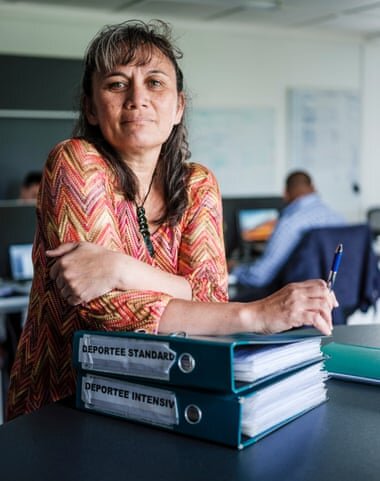Brian* thought by the time he cashed his first pension cheque he would be comfortably retired in his adopted home of Australia, surrounded by his six children and grandchildren, enjoying a quieter phase of life.
Instead the 70-year-old is spending listless days lying on a bed in a one-room shack on the outskirts of Auckland. The first time he set foot in New Zealand in more than 40 years was when he was deported there by Australia in July. He has thought about going to church to try to meet people but his finances are tight and his drive to explore his new home is low. Brian is lonely.
“I completed my sentence, I paid my debt to society, but then there’s banishment again at the end of it, so it’s like a double jeopardy,” says Brian, who has a criminal conviction for conspiring to manufacture drugs.
“I had diarrhoea for a week before the plane trip over here. I was just so petrified. They just plonk you on a plane and fire you across the ditch. Australia is really brutal.”
Brian is one of more than 1,000 New Zealanders who have been deported by the Australian government under changes made to section 501 of the Migration Act in 2014. Even if they have lived and worked in Australia for decades and gained permanent residency, under the new rules New Zealanders can be ejected on “bad character grounds”, for being sentenced to 12 months or more in jail, or at the discretion of the home affairs minister, all in the name of national security.
Rebecca Powell from Monash University’s Border Crossing Observatory says New Zealanders now make up the majority of people held in Australian immigration detention centres, and are the largest nationality group to have their visas cancelled under the new amendments. New Zealanders of Māori and Pacific Island descent are over-represented.
“There is evidence that increasingly people’s visas are being cancelled on suspicion of criminal activity, and there is definitely evidence that the minister is personally cancelling visas that don’t allow appeals,” Powell says.
Deportations have picked up in the past month. About five arrive in New Zealand every week.
Many of those sent back have lived and worked in Australia for decades, paid taxes, bought houses and raised families there. Deportation orders often arrive out of the blue, and appealing against them has proved fruitless for most, no matter how many ties people have to Australia or how long they have lived there.
Elizabeth Stanley, a professor in criminology at Victoria University, says the criteria for deportation under the 501 amendment continue to widen, despite sustained protests from the New Zealand government and numerous human rights bodies.
“Non-citizens can be deported for who they are, how they act, and even what they might do,” Stanley says.
The struggle to thrive
According to frontline support services, 501 deportees overwhelmingly struggle to thrive when they return to New Zealand, and most have no contacts, friends or family waiting.
Deportees are met at the airport by two police officers and a parole officer from the corrections department. They are fingerprinted, given AU$250 and taken to a motel with accommodation booked for five nights.
After that they are pretty much on their own.
“It’s feels very foreign for them, and very scary,” says Rachael Ngatai, the reintegration manager for PARS, a charity that supports people who have been in prison and deportees. “You most often find people quite stressed, anxious, suspicious and distrusting of the system and the people trying to help them. Others become very entitled: ‘Fuck it, I’m here, what are you going to give me?’”
Ngatai says her only information on the deportees boils down to a once-a-week list of names and flight numbers delivered by Interpol. She and others in the sector have been lobbying the Australian government to provide a safer and more responsible handover of “very vulnerable” people.
She says men and women have walked off the plane with untreated major health issues, in the midst of mental health episodes and actively self-harming and suicidal.
Like Brian, most deportees have no friends or family in New Zealand, no money in their pockets, and an overwhelming sense of hopelessness at how to rebuild their shattered lives in a foreign country.
Lisa*, 46, arrived in Auckland two weeks ago, leaving three children, her partner and her sick, elderly mother behind. She left New Zealand when she was one and had returned only once, in her teens, when representing Australia at an athletics event in shot put, discus and hammer throw.
“When I got off the plane [in New Zealand] I was quite confused … I don’t know how everything works and everything’s written in Māori. I didn’t understand the language. It was daunting,” says Lisa, who is half Māori and has spent 18 months in Sydney’s Villawood detention centre, a place she and Brian describe succinctly as “hell”.
Lisa was put up in a dorm room with two men, which unnerved her, but has since moved into an Auckland boarding house.
“I need my partner here,” she says. “I need to stay off all the bad stuff, stay off all the drugs, stay off the alcohol and smokes. I just need to keep fighting and stay positive. At least I have made one friend; another deportee.”
Ngatai says in the days and weeks after their arrival, deportees are entirely dependent on social services and charities, services that are increasingly stretched as the number of deportees rises.
Support starts with the absolute basics: food parcels, clothes from a charity shop, a bank account and a phone. Then the real battle begins, as Auckland and wider New Zealand are in the middle of a housing crisis.
Finding accommodation for deportees with no local papers, referees or credit history is “nigh on impossible”, says Ngatai, and many end up in disreputable halfway houses or on the street. Even for the most positive and motivated deportees turning to drugs, alcohol and crime is common.
Occasionally a wife or family member will return with the deportee, but those cases are rare.
“It is so lonely for them,” Ngatai says. “We can’t replace the whānau [family], but it’s about trying to make them feel welcome here because this is their home now. Trying to tap them into the areas that they may belong. We’re kind of their family.”
‘Not just doubly punished’
Rehabilitation and reintegration is exceptionally difficult for deportees, says Stanley, much harder than for the domestic prison population.
NZ police say more than 40% of deportees reoffend.
“People are not being just doubly punished but triply or quadruply,” says Stanley, who says the 501 scheme violates the basic principles of rehabilitation. “They lack every support that we know helps people move away from a life of crime.”
Jose Sousa-Santos is an expert in Pacific transnational crime at Massey University. He has been studying the people deported from Australia, and has evidence some are leveraging their Australian criminal connections, especially in the trans-Tasman drug trade.
“Many of these deportees have very strong ties to outlaw motorcycle gangs and criminal syndicates in Australia,” he says. “They’ve got nothing here … so they’re going back into the pattern of reoffending.”
The New Zealand prime minister, Jacinda Ardern, views the 501 policy as unacceptable, and has repeatedly raised it with her Australian counterparts to no avail.
“We have seen cases where there is also almost no connection of an individual to New Zealand,” Ardern said in July. “I consider that to be a corrosive part of that policy. And it’s having a corrosive effect on our relationship.”
For Brian, in the twilight of his life, his simple shack outside Auckland seems the end of the road. He has appealed against his deportation, but hasn’t heard back in three years. According to Pars, few ever do.
In his new home, Brian has told no one about his past, lest the local gang scene get wind of his aptitude for chemistry. Like Lisa, Brian likes New Zealand. He says he has been warmly welcomed by authorities, and the country is friendly and less “racist” than Australia.
Still, though, this isn’t home.
“I’m locked in permanent limbo,” he says. “New Zealand is trying to make me feel at home, but this is not my country. I have nobody here, I have nothing.”
* Brian and Lisa are pseudonyms
The Guardian.

